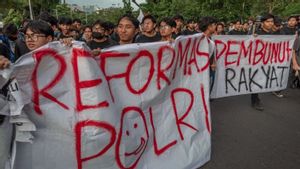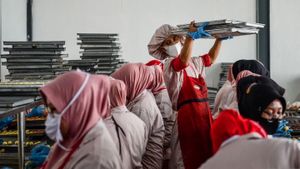JAKARTA In addition to the announcement of martial law, which only lasted six hours, by South Korean President Yoon Suk-yeol some time ago, the Ginseng Country was hit by a no less complicated problem, namely the threat of extinction.
South Korea, known as one of the countries with the largest economic growth and modernization, is currently facing a fertility crisis. If this trend continues, the country's population is threatened with a decline of up to a third at the end of this century.
Based on data from Korean Statistics that was recently released, in 2023 the country's birth rate decreased by eight percent compared to before. The study results show that South Korea's population of 52 million people is currently threatened with a decline to only 17 million people by 2100 if this trend continues.
South Korea's continued decline in population can disrupt economic stability as well as pose an unprecedented social challenge.
Launching Al Jazeera, the birth rate in South Korea reached the lowest point of 0.72 children per woman in 2023. This figure is expected to continue to fall to 0.6 this year.
The decline in birth rates in South Korea could actually have been traced since 1960, when the government at that time was concerned about population growth so rapidly that it exceeded economic growth. At that time, the government implemented a family planning to reduce birth rates.
In that year, South Korea's per capita income was only 20 percent of the global average, while the birth rate was so high, namely six children per girl. In 1982, when the economy grew, the birth rate fell to 2.4.
In 1983, the birth rate continued to decline sharply in the next few decades and arguably this uncontrolled reduction was the beginning of the crisis. The South Korean population is projected to shrink from 52 million to just 17 million by the end of this century.
Some experts estimate the loss of up to 70 percent of the population, could even leave only 14 million people, is a situation that could disrupt economic stability and lead to unprecedented social challenges.
The South Korean government has not remained silent in the face of this situation. Now, for example, they are considering offering 100 million won in cash or equivalent to Rp1.12 billion for each child born, as an effort to improve the birth rate, The Independent reported. The Anti-Corruption & Civil Rights Commission is conducting a public survey to find out the public's assessment before implementing this plan.
The survey was conducted by asking four key questions to assess whether the public supports spending 22 trillion won per year on the initiative and whether financial incentives can encourage couples to have children.
The proposed funding will cost half the national budget to address the low birth rate in the country, which is around 48 trillion won per year.
For now, parents in South Korea have received between 35 million won and 50 million as an incentive for the birth program until their child is seven years old.
In addition, the government itself has implemented a number of policies to encourage birth rates, such as recruiting foreign workers for childcare, providing tax breaks, even allowing men with three children or more at the age of 30 to avoid military academies. However, this series of efforts have not yielded maximum results so far.
According to studies, the South Korean demographic crisis was caused by several factors, but observers agreed that the main cause was due to partner frustration over the increasing cost of living and declining quality of life.
The main problem of this problem is the dynamics of social and cultural in the country. In urban areas, many women place careers as a priority rather than starting a family life.
According to a government survey from 2023, more than half of respondents stated that the burden of raising children is a major problem in women's participation in the work environment.
Increasing double-income households and better access to education allow women to delay or even miss marriage and give birth.
VOIR éGALEMENT:
Furthermore, marriage is no longer considered a must for children. In the past decade, the proportion of people who accept to have children outside of marriage has increased from 22 percent to 35 percent. But only 2.5 percent of children in South Korea were born out of marriage, according to The Economic Times report.
"Having kids is on my list, but I have a promotional opportunity and I don't want to pass it on," said Gwak Tae-hee, a 34-year-old junior manager at a South Korean company, who has been married for three years.
The English, Chinese, Japanese, Arabic, and French versions are automatically generated by the AI. So there may still be inaccuracies in translating, please always see Indonesian as our main language. (system supported by DigitalSiber.id)


















